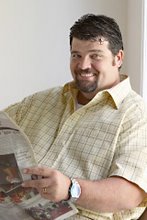I learned a really cool word that became a big part of my vocabulary sometime in the late eighties. Paradox. A paradox is when something seems contradictory or opposing but in reality expresses a truth.
As I progress in Christian thinking, I learn to love the irony of how a paradox works. If you want to live, you’ve got to give up your life. If a guy wants to receive, he has to be an extravagant giver. The way to the throne room is through the servant’s quarters.
God loves a really good paradox. It’s one of the reasons I figure God absolutely loves the Brewer. Yes, that’s right, I am convinced that the great God of this universe loves me personally. I mean, why wouldn’t He? I am a walking paradox. I am a slob that carries around hand sanitizer because I’m a germ freak. I’m a jamming musician that preaches behind a pulpit on Sundays. I am a hillbilly from Johnson County that loves quantum theory.
There are lots of things about all of us that seem to contradict, but actually make up, our unique personalities. God loves that. He loves it when little children speak simple but profound genius. He smiles when He sees busy people slow down to help and great big guys cry over another’s hurt.
He’s like that because He always operates outside of the box. His ways are not our ways. I heard Graham Cooke say that the only time God has ever been in a box was the Arc of the Covenant, and if you touched the box, you died. God hates the box we want to put him in.
We put God in a box because we want God to be more responsible for being like us so we won’t be held responsible for being more like him. We desperately try to make God about our own agendas so we won’t have to be about His. We really want God to look like us and talk like us, and anything that doesn’t line up with who we are, can’t be God. That’s religion, and it’s really ugly.
Most portraits of God tend to fit Him into whatever culture we identify with. In a way, that’s fine because God loves our diverse cultures and how different people live and look.
In the artist’s defense, there are no scriptures describing the physical appearance of Christ because God knew we were knuckleheads. Had the Bible described Jesus as tall, there would be denominations specifically for people six foot two and above. The church in the Middle Ages would have thought it godliness to stretch people until all their joints popped out of place. Oh wait—the church did do that in the Middle Ages.
I saw a picture of Jesus at a shop in the Hong Kong airport that showed him completely Asian. Who among us hasn’t seen blond haired, blue-eyed portraits of Jesus walking across the water in his lily-white feet? We all recently heard Senator Obama’s Pastor in his ridiculous tirade on how Jesus was a poor black child that grew up under the oppression of terrible white people.
I don’t think God looks like any of us. I don’t think He thinks like us or acts like us. The pattern that Jesus showed is that God is the kindest and most thoughtful person in the universe. He loves deeply and lives passionately. Like King David, He has the heart of a warrior poet that kicks butt on the battlefield and intimately loves His bride. I think He could care less about a lot of the hang ups we church folks tend to have about people, and I think He cares a lot more about people having a true encounter with His heart towards them while they are still breathing planet Earth’s air.
He’s totally holy, yet He loves us. That’s a paradox. He’s completely sinless and separate from everything ugly, yet He thinks we’re beautiful. He hates sin and the darkness of our age, yet His goodness is towards us. That’s a paradox, and I love it.
Let me see if I can’t craft some words together that illustrate how God is oxymoronically supernatural. I’ll fill inn the blanks with contradicting terms explaining how God pulls off what nobody else can.
He is majestically humble towards us and anxiously patient with us. He is altogether separate because He climbed down into hell and slapped death in the face for all of us.
He is naturally supernatural and dangerously safe. He has made Himself the permanent substitute for our sin, and His plan is for us to be alone together with Him beyond infinity.
Mark 4:34
He did not say anything to them without using a parable. But when He was alone with His own disciples, He explained everything.
Contact the Brewer@ www.FreshFromTheBrewer.com



